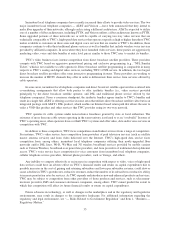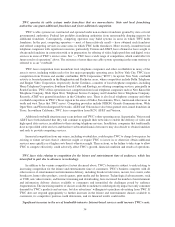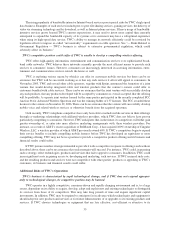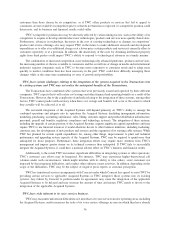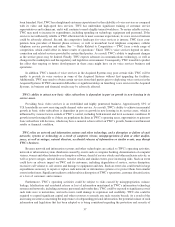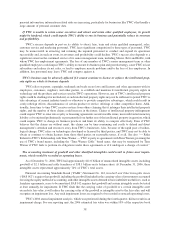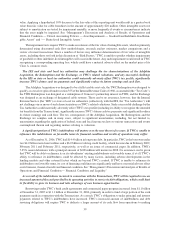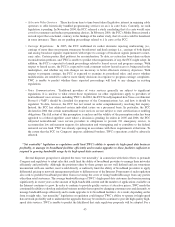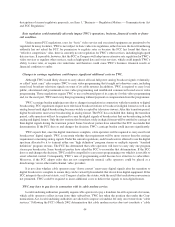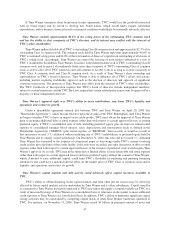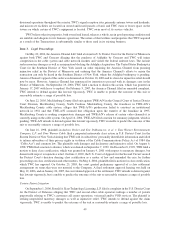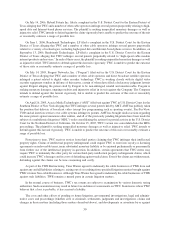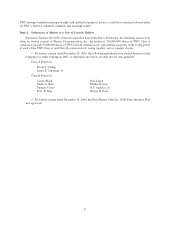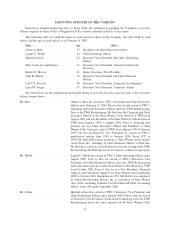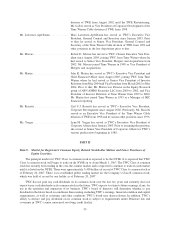Time Warner Cable 2006 Annual Report Download - page 48
Download and view the complete annual report
Please find page 48 of the 2006 Time Warner Cable annual report below. You can navigate through the pages in the report by either clicking on the pages listed below, or by using the keyword search tool below to find specific information within the annual report.•A la carte Video Services. There has from time to time been federal legislative interest in requiring cable
operators to offer historically bundled programming services on an à la carte basis. Currently, no such
legislation is pending. In November 2004, the FCC released a study concluding that à la carte would raise
costs for consumers and reduce programming choices. In February 2006, the FCC’s Media Bureau issued a
revised report that concluded, contrary to the findings of the earlier study, that à la carte could be beneficial
in some instances. There are no pending proceedings related to à la carte at the FCC.
•Carriage Regulations. In 2005, the FCC reaffirmed its earlier decisions rejecting multicasting (i.e.,
carriage of more than one program stream per broadcaster) and dual carriage (i.e., carriage of both digital
and analog broadcast signals) requirements with respect to carriage of broadcast signals pursuant to must-
carry rules. Certain parties filed petitions for reconsideration. To date, no action has been taken on these
reconsideration petitions, and TWC is unable to predict what requirements, if any, the FCC might adopt. In
addition, the FCC is expected to launch proceedings related to leased access and program carriage. With
respect to leased access, the FCC is expected to seek comment on how leased access is being used in the
marketplace, and whether any rule changes are necessary to better effectuate statutory objectives. With
respect to program carriage, the FCC is expected to examine its procedural rules, and assess whether
modifications are needed to achieve more timely decisions in response to program carriage complaints.
TWC is unable to predict whether these expected proceedings will lead to any changes in existing
regulations.
•Voice Communications. Traditional providers of voice services generally are subject to significant
regulations. It is unclear to what extent those regulations (or other regulations) apply to providers of
nontraditional voice services, including TWC’s. In 2004, the FCC broadly inquired how Voice-over Internet
Protocol (“VoIP”) should be classified for purposes of the Communications Act, and how it should be
regulated. To date, however, the FCC has not issued an order comprehensively resolving that inquiry.
Instead, the FCC has addressed certain individual issues on a piecemeal basis. In particular, the FCC
declared in 2004 that certain nontraditional voice services are not subject to state certification or tariffing
obligations. The full extent of this preemption is unclear and the validity of the preemption order has been
appealed to a federal appellate court where a decision is pending. In orders in 2005 and 2006, the FCC
subjected nontraditional voice service providers to obligations to provide 911 emergency service, to
accommodate law enforcement requests for information and wiretapping and to contribute to the federal
universal service fund. TWC was already operating in accordance with these requirements at that time. To
the extent that the FCC (or Congress) imposes additional burdens, TWC’s operations could be adversely
affected.
“Net neutrality” legislation or regulation could limit TWC’s ability to operate its high-speed data business
profitably, to manage its broadband facilities efficiently and to make upgrades to those facilities sufficient to
respond to growing bandwidth usage by its high-speed data customers.
Several disparate groups have adopted the term “net neutrality” in connection with their efforts to persuade
Congress and regulators to adopt rules that could limit the ability of broadband providers to manage their networks
efficiently and profitably. Although the positions taken by these groups are not well defined and are sometimes
inconsistent with one another, most would directly or indirectly limit the ability of broadband providers to apply
differential pricing or network management policies to different uses of the Internet. Proponents of such regulation
also seek to prohibit broadband providers from recovering the costs of rising bandwidth usage from any parties
other than retail customers. The average bandwidth usage of TWC’s high-speed data customers has been increasing
significantly in recent years as the amount of high-bandwidth content and the number of applications available on
the Internet continues to grow. In order to continue to provide quality service at attractive prices, TWC needs the
continued flexibility to develop and refine business models that respond to changing consumer uses and demands, to
manage bandwidth usage efficiently and to make upgrades to its broadband facilities. As a result, depending on the
form it might take, “net neutrality” legislation or regulation could impact TWC’s ability to operate its high-speed
data network profitably and to undertake the upgrades that may be needed to continue to provide high quality high-
speed data services. TWC is unable to predict the likelihood that such regulatory proposals will be adopted. For a
43


